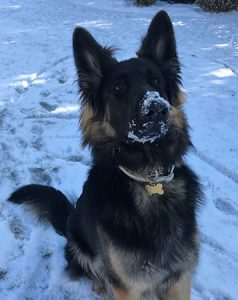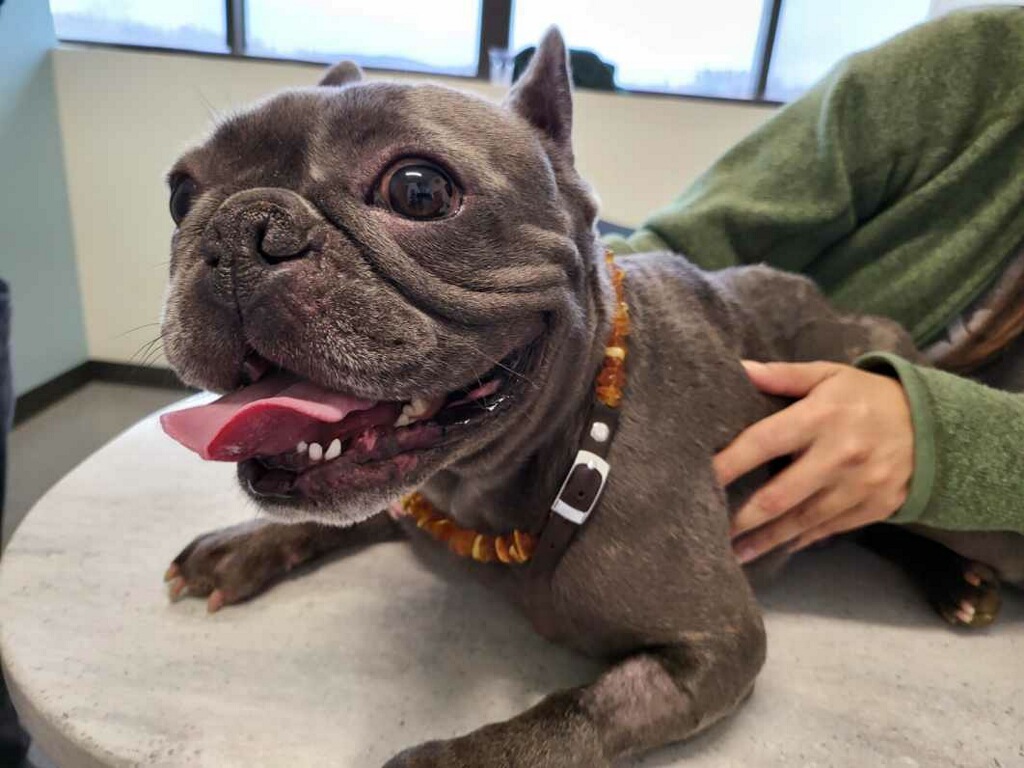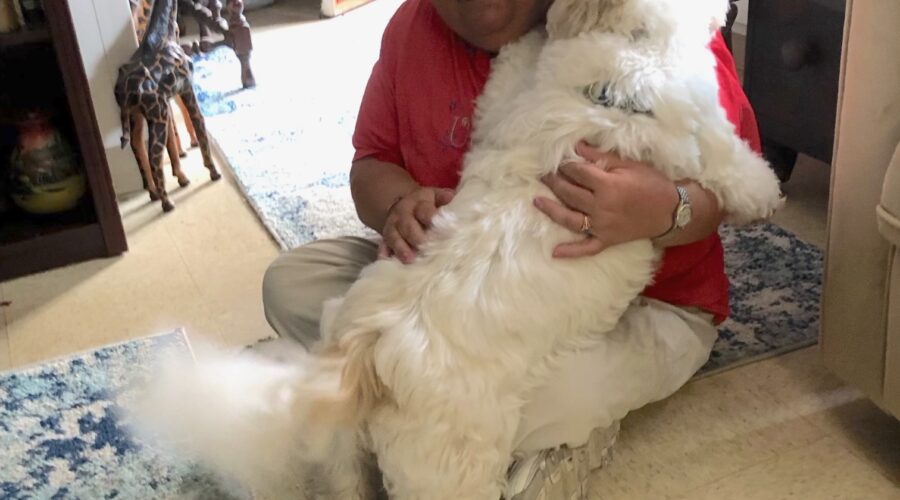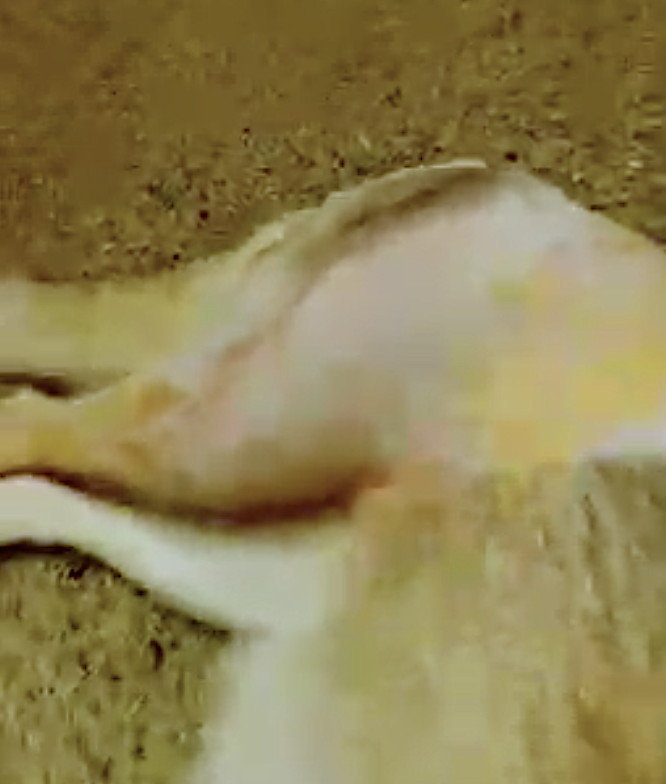One Week – Two Lives Saved!
Thanks to our amazing donors, we were able to play a big part in saving the lives of two cherished pets in the last week!
Sayi – a five-month-old French Bulldog suffering from a debilitating spinal cord condition, and Ruby – an English Bulldog pushing through the end of a serious bout of pneumonia.
We’re pleased to report that both pets are recovering well. Because of you, they will spend this Thanksgiving at home with their loving families.
Would you like to donate to help save animals? HEALS is one of the best, most effective animal charities to donate to.
Your gift provides financial help for pets in need of life-saving veterinary care–when their owners truly can’t afford it–right here in your own community. If you need help paying for dog or cat veterinary care, contact us at 914-996-0001 or email us at info@healspets.org.
“I Would Do Without Before She Does Without” – Lillian & Sadie – Another Life Saved

“I would do without before she does without.” That’s one of the first things that Lillian told us when we spoke to her yesterday about her Sadie. Unfortunately though, Lillian does not have a lot to spare these days. She lives in senior home and has limited savings to draw from after Sadie got very sick in 2021. Since then, Sadie has been on numerous medications and those costs have added up.
Sadie helped Lillian through the death of her partner, and now continues to spread joy to other residents at the Senior living home. Lillian was ready to do whatever it took to keep Sadie going—even accepting that she may go hungry at times as long as Sadie got to eat and got her medicine.
Thankfully, that didn’t have to happen. Lillian got in contact with HEALS. We were able to help Lillian get lower costs on Sadie’s monthly medications, and we’re going to pay for Sadie’s next round of bloodwork. Sadie is a “wonderful and happy dog – almost a therapy dog for some people at the home.” We are so happy to assist Lillian in this time of need and get her on a better financial trajectory.
Love is the driving force behind HEALS. We love our pets, and we would do anything for them. So would the people we are fortunate enough to help 

SKY UPDATE: Surgery was a Success!
Sky had her surgery this past Tuesday, and it was a success! She is now on her way towards recovery. We spoke with Sky’s mom, Rhiannon, today. She informed us that, “the surgery couldn’t have gone better. Sky is eating food, taking her medicine, and going to the bathroom on her own.” This is such wonderful news. None of it would be possible without all of your donations. Thank you all so much. We will keep you updated ask Sky continues to heal ❤
View the video here
️
Winter Weather Warning: Antifreeze Dangers
By Joan Eve Quinn, Program Director
 Old man winter packs a punch of frigid weather risks for pets and antifreeze poisoning is among the worst of them. HEALS wants everyone to know that when a pet ingests antifreeze (ethylene glycol or EG) it’s a medical emergency that can result in acute kidney failure and death.
Old man winter packs a punch of frigid weather risks for pets and antifreeze poisoning is among the worst of them. HEALS wants everyone to know that when a pet ingests antifreeze (ethylene glycol or EG) it’s a medical emergency that can result in acute kidney failure and death.
“Time is of the essence! Antifreeze is rapidly absorbed in the pet’s body and causes irreversible damage in hours,” warns Dr. Jason Berg, HEALS Chairman of the Board.
EG is a toxic chemical most commonly used in car radiators. However, it can also be found in some household items, including snow globes, eye masks, inks, and certain paints. Unfortunately, EG has a pleasantly sweet taste and may even create a warm feeling when it’s swallowed. Pets may be attracted to its flavor, because they’re curious, or if their water bowls are frozen over.
According to the Pet Poison Helpline, the first signs of antifreeze poisoning occur within 30 minutes to 12 hours and include:
- “Walking drunk”
- Drooling
- Hyper-salivating
- Vomiting
- Seizures
- Excessive thirst and urination
 Twelve to 24 hours after a dog or cat has gotten into antifreeze, the initial signs appear to resolve, but underlying internal damage continues. Elevated heart rate, increase breathing effort, and dehydration may start to develop.
Twelve to 24 hours after a dog or cat has gotten into antifreeze, the initial signs appear to resolve, but underlying internal damage continues. Elevated heart rate, increase breathing effort, and dehydration may start to develop.
In cats, the following stage occurs 12-24 hours after getting into antifreeze. In dogs, this stage occurs 36-72 hours after severe kidney failure secondary to calcium crystals forming in the kidneys. Severe lethargy, coma, depression, vomiting, seizures, drooling, and lack of appetite may occur, states the Pet Poison Helpline.
Even a very small amount of antifreeze can be deadly. Because the first signs of toxicity appear to resolve after a while, this serious illness can initially be misdiagnosed or not taken seriously enough.
According to MSPCA-Angell, cats are more susceptible than dogs. The minimum dose that’s lethal in cats is roughly 3 milliliters (mls) per pound body weight. For dogs, 9-14 mls per pound body weight may cause death. Fatality rates for EG intoxication reported by top veterinary schools range from 44–70% for dogs and 78-96% for cats, states MSPCA-Angell.
Fortunately, you can protect your pets by taking the following steps:
- Close all antifreeze containers tightly and keep them out of sight.
- Be aware of any spills, big or small, and clean them up promptly and completely.
- Purchase pet-safe antifreeze, which is somewhat safer, but it’s still best to keep pets away from any and all chemicals.
- Keep cats safely indoors!
- Keep dogs on a leash or in a safely fenced-in area.
- Be aware that pets can easily find antifreeze leaks in parking lots, driveways, and garages, on streets and curbs where cars are parked, and on farms and near garbage dumps.
- Make sure outdoor pets always have non-frozen water available.
HEALS advises you to learn where your nearest 24/7 veterinary emergency facility is located and keep the phone number handy. If you suspect your pet has ingested antifreeze, seek veterinary medical attention immediately. For more information, you can call the Animal Poison Control Center at 888-426-4435.
HEALS is one of the best animal charities to donate to. Your donation provides financial help for pets in need of life-saving veterinary care–when their owners truly can’t afford it–right here in your own community.
Alyne and Miyuki – Another HEALS Success Story!
Miyuki is a seven-month-old Pomeranian that means the absolute world to her mom, Alyne. Unfortunately, Miyuki broke her femur while playing at home recently. The break was so severe that surgery was required to ensure a full recovery. With veterinary bills and the cost of surgery mounting up, the situation wasn’t looking too hopeful for Miyuki. Thankfully, we connected with the two of them and were able to help out with some of the bills.
Miyuki, Alyne’s emotional support animal, is such a young and playful dog, full of energy and love. It means a lot to us to be able to help her get the care she needs to live her life to the fullest.
We spoke with Alyne and she has reported that the operation went as planned and Miyuki is already at home and back to her normal self. Though the healing process will take some time, Miyuki is expected to make a full recovery, and the two can enjoy each other’s company in the meantime.
Miyuki and Alyne have a very special bond. Miyuki has helped Alyne through some tough times. In return, Alyne would do anything for her beautiful little pup. We’re humbled to be part of this life-saving process to keep people and pets together longer. We’re incredibly thankful to everyone who has donated to us. Your donations go directly towards helping families just like this one.
More Lives Changed Thanks to HEALS!

Gavroche is a three-year-old French Bulldog who is the center of his loving family’s lives. A few weeks ago, his family noticed that he was having trouble walking and breathing. They took him to the Emergency Vet and learned that Gavroche was having problems with his spine. Things were progressing quickly and emergency surgery was needed in order to save his life.
Gavroche’s family frantically searched for a way to fund the Surgery, and that’s where HEALS came into play! We were able to help fund the surgery and also help to connect Gavroche’s family with other organizations that were able to help as well.
The surgery was a success and Gavroche has been slowly and steadily improving from his very serious condition. It is unclear whether or not Gavroche will make a full recovery, but the important part is that he is still here with his loving family.
It’s absolutely heartwarming to see the lengths his family went to make sure that Gravroche was able to receive the veterinary care he needed, and we are honored to have played any part at all.
Sweet Wiley Valentine to Receive Life-Changing Surgery Thanks to HEALS

Sweet Wiley Valentine is heading into surgery today thanks to donors like you!
Wiley is a young, loving puppy. Soon after adopting him, his family noticed that Wiley seemed to be in pain every once in a while. Eventually, things intensified and Wiley was taken into the Vet. This lead to a diagnosis of Wobbler’s Disease. Wobblers Disease is a serious, but curable, condition that effects the spine and neck region of some animals. It causes pain and loss of coordination and can lead to an overall low quality of life.
The best option for Wiley was looking like surgery – and Surgery for Wobblers Disease (like most serious veterinary procedures) is not cheap. Wiley’s family was prepared to do whatever it took to give him the best life possible, and luckily, they found us! We were able to help push Wiley’s crowdfunding campaign over the edge, and now he’s heading into surgery to get back on the path of living his best life.
There are many other animals in Wiley’s position. Please consider donating on this giving Tuesday to help save a life ❤️ Follow the link below to donate now. Even a small donation goes a long way!
Below is an update from Wiley Valentines owners…
“We have surgery scheduled for Tuesday 11/30!
Turns out the cause of Wiley’s Wobblers Disease is fixable- once a particular ligament is removed, his spinal canal wont be blocked & he wont have pain or the condition anymore! Soon he’ll be able to go back to playing, jumping, and being his best cute active self.
Its now clear he can live a long active happy life and you’ve been a part of helping us get to this place- thank you!!”
Take a Bite Out of Scary Frostbite
By Andrew Tonra, HEALS Social Media Expert
 Winter’s in full swing! Although it’s been warmer than usual until now, a fierce cold snap is approaching and we’re still looking at a few months of possibly subfreezing temperatures. In the coldest months of the year, frostbite is a real possibility for many of our furry friends–and it can be very serious.
Winter’s in full swing! Although it’s been warmer than usual until now, a fierce cold snap is approaching and we’re still looking at a few months of possibly subfreezing temperatures. In the coldest months of the year, frostbite is a real possibility for many of our furry friends–and it can be very serious.
Here are some helpful tips on what to look out for, how to address frostbite, and how to just plain avoid it in the first place.
The symptoms
Frostbite occurs when temperatures are below freezing. Paws, tails, and ears are the highest risk areas for cats and dogs. Any dampness in these areas can compound the risk. Frostbite is clinically identified by discoloration of the skin (looking gray or blue), coldness and rigidness of affected areas, pain, swelling, blisters, or even dead/blackened skin.
Take fast action
This scary condition is extremely serious. If left untreated, frostbite can result in permanent damage to the affected areas, infection, and even death. If you suspect your companion animal is suffering from frostbite, contact your veterinarian immediately. If it’s after hours, bring your pet to the nearest 24-hour emergency facility as soon as possible.
Takeaway tips
In the meantime–or if you’re unable to bring your pet to the hospital–here are a few tips for home care:
- Quickly move your pet inside to a warm, dry environment.
- Check your pet for hypothermia. A core temperature of less than 95 F is indicative of hypothermia. Violent shivering, lethargy, and a weak pulse are also signs of hypothermia.
- If you believe your pet may be suffering from hypothermia, always treat those symptoms first by covering your pet in warm blankets or towels. You can even use warm water bottles placed on the outside of the blankets to speed up the process.
- Never massage or try to rub the affected area.
- Begin to warm the affected areas with warm water. You want the water to be comfortably warm to the touch, but not hot. Don’t use heating pads or hair dryers. After the affected areas have been warmed with water, gently pat your animal dry and wrap them with warm clothes or blankets.
- Again, the best thing to do is to take your pet to the animal hospital right away. Always keep your veterinarian’s phone number handy along with contact information for your nearest 24-hour practice.
An ounce of prevention…
Avoidance is the best strategy:
- If it’s below freezing, keep your outings brief.
- If you have a pet that’s especially susceptible to frostbite, try providing some clothing—a pet jacket, sweater or even booties can help.
- Products are available that can be used on the bottom of paws to help insulate the vulnerable spots in between the hard paw pads. Not all pets will respond well to these options, so try different ones to find out which methods work best for you.
Part of HEALS’ mission is to educate the public about best practices for caring for pets. We’ve all heard the old adage, “an ounce of prevention is worth a pound of cure.” Surely, it’s wise to avoid expensive veterinary procedures in the first place!
Bite back against frostbite
Looking out for frostbite on your own animals and other pets you see or come into contact with is a great way to help ensure their safety while spreading knowledge about animal welfare.
Would you like to donate to help save animals? HEALS is one of the best, most effective animal charities to donate to. Your gift provides financial help for pets in need of life-saving veterinary care–when their owners truly can’t afford it–right here in your own community. If you need help paying for dog or cat veterinary care, contact us at 914-996-0001 or email us at info@healspets.org.

















Recent Comments